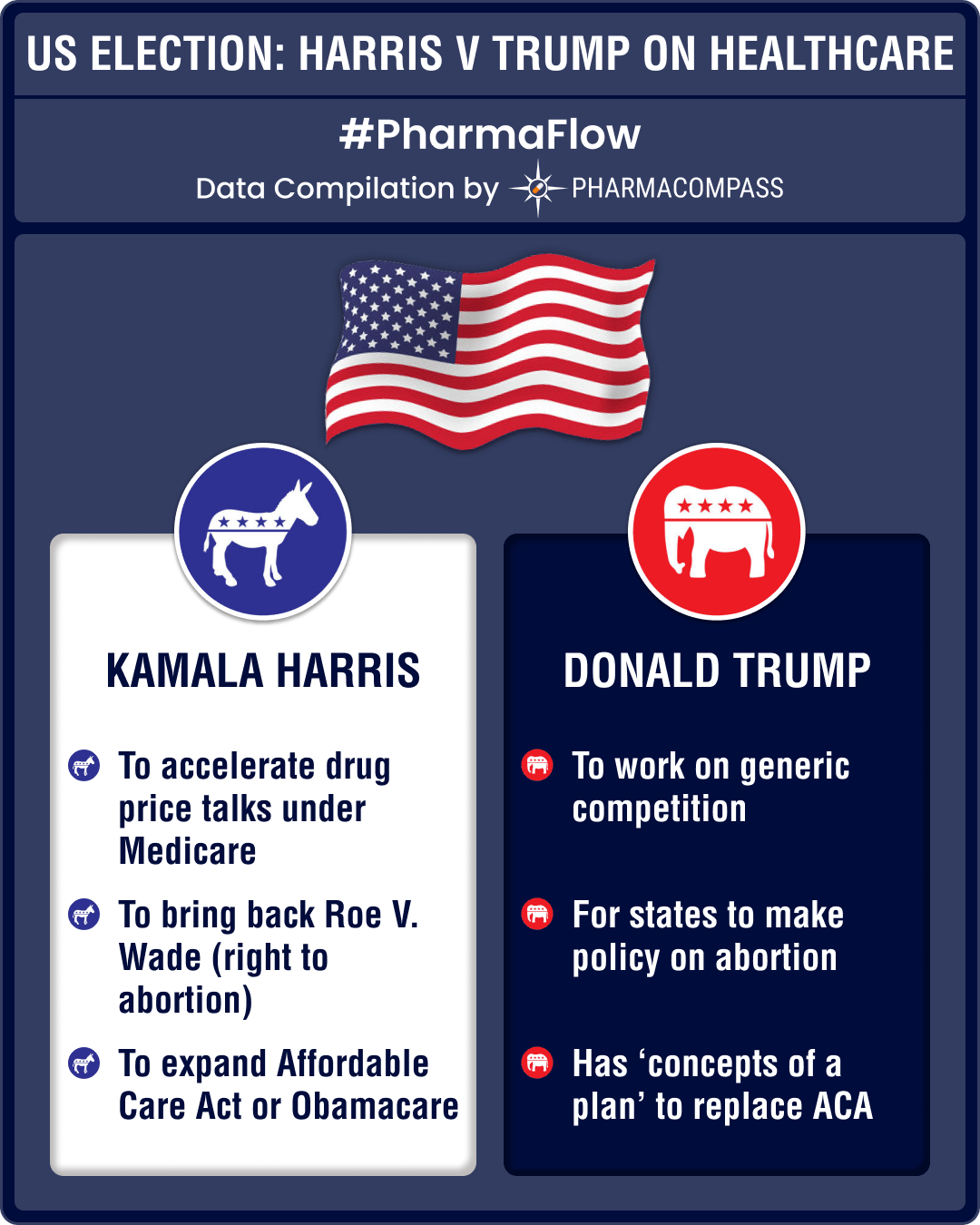
By PharmaCompass
2024-09-26
Impressions: 2873
The US is in the midst of yet another, or perhaps the most, polarizing Presidential election. The two candidates have highly divergent personas, records, visions and views. That gets reflected in their starkly different visions for the healthcare system.
Healthcare is the second most important issue for voters in the 2024 US elections, with only the economy ranking higher, according to the Pew Research Center.
In this week’s PharmaFlow, we look at the past approaches of both the contenders — Democratic presidential nominee Kamala Harris and Republican contender Donald Trump — towards healthcare, and what the two presidencies could mean for the US healthcare industry.
Both Harris and Trump have a rare point of agreement — that the US government should act on reducing high drug prices. But have they spelt out how they will make healthcare more accessible? Our analysis should give you some answers.
Abortion remains a pivotal issue, may shape broader discussions on healthcare
Trump takes pride in the fact that he played an important role in overturning Roe v. Wade, a ruling that protected the abortion rights of women across America. Trump did that by selecting Supreme Court justices who were instrumental in overturning it.
Two and a half years after Roe v. Wade was overturned, Trump faces an electorate that largely seems to favor abortion rights — according to Pew Research, 63 percent respondents say abortion should be legal in all or most cases, while 36 percent say it should be illegal in all or most cases.
Candidates’ stances on abortion access, including the regulation on medications like mifepristone, are being scrutinized by both supporters and opponents of abortion rights. In June this year, the US Supreme Court had unanimously rejected a case to restrict access to the abortion drug mifepristone. The demand for its ban had been raised by an anti-abortion group in Texas.
Of late, there have been reports of Republicans trying to distance themselves from aggressive anti-abortion ideas coming from its party men and allies. Aiming to carve-out a political middle ground, Trump has said that abortion policy should be made by the states. Despite Trump’s softening of stance, abortion rights is likely to not only affect voter turnout, but also shape broader discussions on healthcare and women’s rights.
Affordable Care Act: Harris to strengthen it, Trump has ‘concepts of a plan’ to replace it
Harris has been all for expanding and strengthening the Affordable Care Act (ACA). She has promised to “make affordable healthcare a right, not a privilege.”
Trump, on the other hand, had made attempts during his presidency to repeal and replace the ACA, arguing that it provided “lousy healthcare.” While those efforts ultimately failed in the Senate, Trump succeeded in weakening the ACA by eliminating the individual mandate penalty through the 2017 Tax Cuts and Jobs Act.
In a potential second term, Trump might renew efforts to dismantle or significantly alter the ACA. Although he has not presented a comprehensive replacement plan, he said during the Presidential debate held on September 9 that he has “concepts of a plan.”
Drug prices: Harris to accelerate Medicare price cuts; Trump to focus on generics
Harris has had an aggressive stance on reducing prescription drug costs. Her tie-breaking vote on the Inflation Reduction Act gave Medicare the power to negotiate lower drug prices with pharmaceutical companies.
Harris has pledged to accelerate those negotiations, once she becomes President, to cover more drugs and further lower prices for Americans. She also intends to extend the US$ 35 cap on insulin and the US$ 2,000 cap on out-of-pocket spending for seniors to all Americans, not just those on Medicare.
Harris plans to make permanent the Biden-Harris tax credit enhancements that have already lowered healthcare premiums by an average of about US$ 800 a year for millions of Americans. This move would ensure continued accessibility to health insurance for a broader segment of the population.
However, her stance on insurance companies and Big Pharma, including her support for “march-in” rights, might face resistance from pharmaceutical companies concerned about maintaining incentives for innovation.
On the issue of drug pricing, Trump’s record is mixed. While he took credit for some decreases in prescription drug prices during his presidency, his administration’s most significant regulatory changes often favored pharmaceutical companies.
Trump did issue a rule setting up a path to import drugs from Canada and other countries, but this initiative has faced significant hurdles, including pushback from Canadian authorities.
Trump’s stance on drug pricing for a potential second term appears to focus on increasing generic and biosimilar competition, importing drugs made in the US but sold overseas back to the US, and capping out-of-pocket insulin costs. While he has criticized Big Pharma for putting profits above people, his administration’s policies had often aligned with industry interests.
Harris appears committed to drug control; Trump had cut public health funds
Mental health and substance abuse are the other areas where Harris has shown strong commitment. Having prosecuted drug traffickers, she has demonstrated her commitment to curbing the opioid epidemic.
In the White House, she helped direct more than US$ 150 billion to disrupt the flow of illicit drugs and delivered billions of dollars in investments to states to fund lifesaving programs.
Under a Harris administration, we might see increased funding for addiction treatment programs and continued efforts to make overdose-reversal drugs like naloxone more accessible.
During his presidency, Trump had significantly reduced funding for public health programs.
His administration had suggested budget cuts to the Centers for Disease Control and Prevention (CDC) and other public health agencies, justifying them as measures for fiscal responsibility.
Our view
Given her record, a Harris presidency could lead to increased insurance coverage. However, it might also come with increased regulation and price controls. More aggressive drug price negotiations could pressure pharmaceutical companies’ profit margins, potentially affecting R&D budgets. Stricter vigilance on the pharmaceutical industry could lead to more litigation and regulatory challenges for drug companies. But in the long run, this might also improve public trust in drug companies and in the healthcare systems.
Under a second Trump term, reduced public health funding could create challenges for community health providers and public health initiatives. An emphasis on generic competition could pressure brand-name drug manufacturers, but create opportunities for generic drug makers.
The PharmaCompass Newsletter – Sign Up, Stay Ahead
Feedback, help us to improve. Click here
Image Credit : US ELECTION_ HARRIS v TRUMP ON HEALTHCARE by PharmaCompass license under CC BY 2.0
“ The article is based on the information available in public and which the author believes to be true. The author is not disseminating any information, which the author believes or knows, is confidential or in conflict with the privacy of any person. The views expressed or information supplied through this article is mere opinion and observation of the author. The author does not intend to defame, insult or, cause loss or damage to anyone, in any manner, through this article.”








